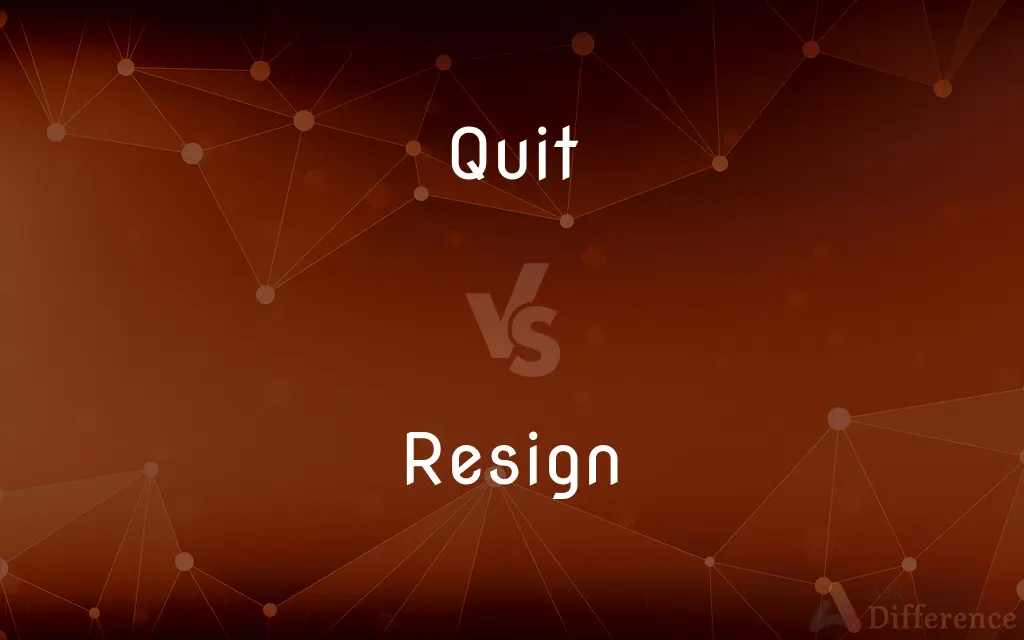Quit vs. Resign — What's the Difference?
By Urooj Arif & Fiza Rafique — Updated on April 17, 2024
Quitting is generally an informal separation from a job, often immediate and unilateral, while resigning is a formal process, typically involving notice and a resignation letter.

Difference Between Quit and Resign
Table of Contents
ADVERTISEMENT
Key Differences
Quitting a job is usually a spontaneous decision, driven by personal reasons, dissatisfaction, or a better opportunity elsewhere. On the other hand, resigning tends to be a planned and structured departure, marked by providing advance notice and a formal resignation letter to the employer.
When someone quits, they might leave without fulfilling the notice period, possibly affecting their professional reputation. Conversely, resigning formally helps maintain professional relationships and often includes fulfilling all job responsibilities until departure.
Quitting can be seen as a reaction to immediate circumstances, such as a stressful work environment or personal issues. Whereas, resigning is often a result of thoughtful career planning, including considerations for future employment prospects.
In terms of legal and administrative implications, quitting abruptly may lead to forfeiting certain benefits, like severance or unpaid bonuses. Resigning, especially with notice, typically safeguards these benefits and ensures compliance with employment contracts.
The manner of quitting might not require official documentation; however, resigning usually involves a formal letter and sometimes a transition period, during which the resigning employee might train a replacement or close ongoing projects.
ADVERTISEMENT
Comparison Chart
Formality
Informal, often verbal
Formal, usually written
Notice Period
Often none or very short
Typically required (2 weeks+)
Reasoning
Personal, immediate issues
Career planning, professional
Professional Impact
Potentially negative
Generally neutral or positive
Documentation
Minimal or none
Resignation letter, possibly exit interviews
Compare with Definitions
Quit
Quitting is the act of leaving a job suddenly without formal notice.
Frustrated with the management, he decided to quit the same day.
Resign
The resignation process usually includes writing a formal resignation letter.
He submitted a detailed resignation letter expressing gratitude for the opportunities.
Quit
Quitting can be driven by an immediate, often emotional decision.
Overwhelmed by stress, he quit without a backup plan.
Resign
A resignation typically involves a notice period, allowing the employer to find a replacement.
He resigned with a month's notice, aligning with company policy.
Quit
In many cases, quitting a job does not involve a formal resignation letter.
After the argument, she quit verbally and didn't come back.
Resign
Resigning is the formal process of notifying an employer of one's intention to leave the job.
After careful consideration, she resigned to pursue another career path.
Quit
When quitting, an employee may leave immediately without providing a transition period.
She quit her job abruptly, leaving her team in a difficult position.
Resign
Resigning is often part of a strategic career move or professional transition.
She resigned from her corporate job to start her own business.
Quit
Quitting might affect eligibility for certain benefits like unemployment insurance.
By quitting his job, he became ineligible for unemployment benefits.
Resign
Proper resignation helps maintain professional relationships and references.
By resigning professionally, she left on good terms with her employer.
Quit
To cease or discontinue
Asked them to quit talking.
Quit smoking.
Resign
To submit (oneself) passively; accept as inevitable
I resigned myself to a long wait in line.
Quit
To resign from or relinquish
Quit a job.
Resign
To give up (a position, for example), especially by formal notification.
Quit
To depart from; leave
"You and I are on the point of quitting the theater of our exploits" (Horatio Nelson).
Resign
To relinquish (a privilege, right, or claim).
Quit
To leave the company of
Had to quit the gathering in order to be home by midnight.
Resign
To give up one's job or office; quit, especially by formal notification
Resign from a board of directors.
Quit
(Computers) To exit (an application).
Resign
(transitive) To give up; to relinquish ownership of.
Quit
To rid oneself of by paying
Quit a debt.
Resign
(transitive) To hand over (something to someone), place into the care or control of another.
Quit
To release from a burden or responsibility.
Resign
To quit (a job or position).
I am resigning in protest of the unfair treatment of our employees.
He resigned the crown to follow his heart.
Quit
To cease an action or cease working properly; stop
The car quit on the hill.
Resign
(transitive) To submit passively; to give up as hopeless or inevitable.
He had no choice but to resign the game and let his opponent become the champion.
Quit
To abandon an activity out of frustration or despair; give up
Saw that he would never get the part and quit.
Resign
(proscribed) re-sign
Quit
To resign from or leave a job.
Resign
To sign back; to return by a formal act; to yield to another; to surrender; - said especially of office or emolument. Hence, to give up; to yield; to submit; - said of the wishes or will, or of something valued; - also often used reflexively.
I here resign my government to thee.
Lament not, Eve, but patiently resignWhat justly thou hast lost.
What more reasonable, than that we should in all things resign up ourselves to the will of God?
Quit
Absolved of a duty or an obligation; free.
Resign
To relinquish; to abandon.
He soon resigned his former suit.
Quit
(usually followed by of) Released from obligation, penalty, etc; free, clear, or rid.
Resign
To commit to the care of; to consign.
Gentlement of quality have been sent beyong the seas, resigned and concredited to the conduct of such as they call governors.
Quit
To pay (a debt, fine etc.).
Resign
Leave (a job, post, post, or position) voluntarily;
She vacated the position when she got pregnant
The chairman resigned when he was found to have misappropriated funds
Quit
To repay (someone) for (something).
Resign
Give up or retire from a position;
The Secretary fo the Navy will leave office next month
The chairman resigned over the financial scandal
Quit
To repay, pay back (a good deed, injury etc.).
Resign
Part with a possession or right;
I am relinquishing my bedroom to the long-term house guest
Resign a claim to the throne
Quit
To conduct or acquit (oneself); to behave (in a specified way).
Quit
To carry through; to go through to the end.
Quit
(transitive) To set at rest; to free, as from anything harmful or oppressive; to relieve; to clear; to liberate.
Quit
(transitive) To release from obligation, accusation, penalty, etc.; to absolve; to acquit.
Quit
(transitive) To abandon, renounce (a thing).
Quit
(transitive) To leave (a place).
Quit
To resign from (a job, office, position, etc.).
After having to work overtime without being paid, I quit my job.
Quit
To stop, give up (an activity) (usually + gerund or verbal noun).
John is planning to quit smoking.
Quit
To close (an application).
Quit
Any of numerous species of small passerine birds native to tropical America.
Quit
Any one of numerous species of small passerine birds native of tropical America. See Banana quit, under Banana, and Guitguit.
Quit
Released from obligation, charge, penalty, etc.; free; clear; absolved; acquitted.
The owner of the ox shall be quit.
Quit
To release from obligation, accusation, penalty, or the like; to absolve; to acquit.
There may no gold them quyte.
God will relent, and quit thee all his debt.
Quit
To discharge, as an obligation or duty; to meet and satisfy, as a claim or debt; to make payment for or of; to requite; to repay.
The blissful martyr quyte you your meed.
Enkindle all the sparks of natureTo quit this horrid act.
Before that judge that quits each soul his hire.
Quit
To meet the claims upon, or expectations entertained of; to conduct; to acquit; - used reflexively.
Be strong, and quit yourselves like men.
Samson hath quit himselfLike Samson.
Quit
To carry through; to go through to the end.
Never worthy prince a day did quitWith greater hazard and with more renown.
Quit
To have done with; to cease from; to stop; hence, to depart from; to leave; to forsake; as, to quit work; to quit the place; to quit jesting.
Such a superficial way of examining is to quit truth for appearance.
Does not the earth quit scores with all the elements in the noble fruits that issue from it?
Quit
To go away; to depart; to stop doing a thing; to cease.
Quit
Put an end to a state or an activity;
Quit teasing your little brother
Quit
Give up or retire from a position;
The Secretary fo the Navy will leave office next month
The chairman resigned over the financial scandal
Quit
Go away or leave
Quit
Turn away from; give up;
I am foreswearing women forever
Quit
Give up in the face of defeat of lacking hope; admit defeat;
In the second round, the challenger gave up
Common Curiosities
How can I quit a job without negative consequences?
It's best to communicate openly with your employer, provide sufficient notice if possible, and offer to help with the transition.
What is the difference between quitting and resigning?
Quitting is often informal and immediate, while resigning involves a formal notice and is typically well-planned.
Can quitting affect my professional reputation?
Yes, quitting abruptly can harm your professional reputation and future job prospects.
What should be included in a resignation letter?
A resignation letter should include the intent to resign, the effective date, and a brief mention of the reason for leaving, often accompanied by a thank you to the employer.
Can I resign for personal reasons?
Yes, many people resign for personal reasons, and it is generally accepted as long as the resignation is handled professionally.
Should I quit if I am unhappy at work?
It's advisable to first explore other options like discussing the issues with your supervisor or HR, or looking for another job before quitting.
Is it okay to quit over email?
While not ideal, quitting over email might be necessary if immediate circumstances prevent a face-to-face conversation.
How can quitting or resigning affect my career in the long term?
Resigning professionally tends to have a neutral or positive effect, whereas quitting, especially repeatedly or under contentious circumstances, can have long-term negative implications.
Is notice always required when resigning?
While not always legally required, notice is typically expected and can vary from one to several weeks, depending on the job and the company.
What happens if I quit without notice?
Quitting without notice can lead to lost benefits, ineligible for rehire status at the company, and potential legal issues if it breaches an employment contract.
What are the benefits of resigning over quitting?
Resigning formally helps maintain better relationships with past employers and can assist in obtaining future employment references.
What is the usual notice period for resigning?
The standard notice period is typically two weeks, but it can vary based on company policy and the position held.
What legal protections do I have when resigning or quitting?
Legal protections usually cover wrongful termination and ensuring owed compensation is paid. It's important to know your rights and possibly consult with legal counsel if uncertain.
How do I handle a resignation in a small company?
Handle it delicately, as personal relationships are more impactful in small businesses. A transparent, respectful approach is advisable.
Can I take back a resignation?
It's possible if the employer agrees, but this should not be counted on as a viable option.
Share Your Discovery

Previous Comparison
Coenocytic vs. Heterotrichous
Next Comparison
Dholak vs. DholAuthor Spotlight
Written by
Urooj ArifUrooj is a skilled content writer at Ask Difference, known for her exceptional ability to simplify complex topics into engaging and informative content. With a passion for research and a flair for clear, concise writing, she consistently delivers articles that resonate with our diverse audience.
Co-written by
Fiza RafiqueFiza Rafique is a skilled content writer at AskDifference.com, where she meticulously refines and enhances written pieces. Drawing from her vast editorial expertise, Fiza ensures clarity, accuracy, and precision in every article. Passionate about language, she continually seeks to elevate the quality of content for readers worldwide.














































